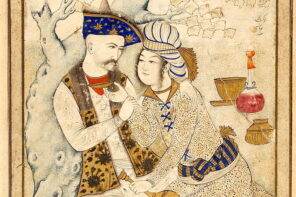The most controversial biographical fact about Tariq Ramadan is also the most central. The self-described “activist professor,” prolific author, and recent headline speaker at the American Academy of Religion’s annual meeting, is a subject of international fame and infamy; yet this infamy seems less tied to the revolutionary political agenda advanced in his work than to that central and most controversial fact—that Ramadan is a Muslim.
Indeed, for Ramadan, all of his thought and work emerges from his acceptance of the claim that the one and only God, Allah, creator of the universe, twice offered Revelations of His truth to humanity, twice saw these Revelations corrupted in the course of human history, and, finally, conveyed the final Revelation to an exemplary human, the Prophet Muhammad, around whom a community of Companions arose, taking pains to preserve this Revelation, word for word, as a template for human action in the world.
The problem comes in with the way people—from fellow celebrity thinkers to professional opinion-mongers—react to Ramadan’s deeply held religious beliefs. Bernard-Henri Lévy calls Ramadan “the Genevan imam” and accuses him of hate speech in his criticisms of Israeli policy; Christopher Hitchens, infuriated with the persistence of religious belief in general, sees evidence in Ramadan’s smooth presentation style that “the soft mainstreaming of Islamic imperialism is under way.” More partisan outlets, like Canada’s National Post, do not hesitate to call Ramadan a covert extremist. Throughout much criticism of Ramadan there is the notion that he is pulling off some kind of elaborate charade, passing as “modern” and “Western” when he is really, essentially “Islamic,” a closet booster for theocracy, ready to applaud the imposition of Sharia on the citizenry of the world.
Such thinking is not only wrong, it relies upon a racist division of the Muslim from modern, Western civilization; as if the “Muslim” automatically denotes something backward and threatening while “modern” and “Western” signify a purely secular politics, unmotivated by religion, or, at worst, affiliated with a liberal, universalist theology anathema to the “fundamentalist” claims of other, non-Western faiths. This is silly, but also dangerous.
Ramadan is a committed Muslim believer who returns to the text and the traditions in order to envision a radically new, more just, more ethical world. This project involves not only a deep sense for Islamic tradition but also daring rereadings of the texts, from a subtle appreciation for, say, the role of nature and the environment in the life of the Prophet to a call, based on an understanding of the most basic ethical claims of the Qur’an, for world economic renovation.
Ramadan makes it repeatedly clear that he is defining this sense of ethics in terms of his religion, speaking of an explicitly Islamic conscience and an Islamic ethics. Yet, in contrast with theocratic “Islamic Revolutions” such as that in Iran (which, rather than eliminating social oppression and establishing an ethical order, merely replace one oppressive regime with another in the name of religion) Ramadan, in his work, emphasizes again and again his commitment to the Qur’anic principle of religious diversity and respect for religious differences and freedom of conscience.
From the Abstract to the Concrete
Such claims—so at odds with popular conceptions of Islam and, indeed, from the very real ideologies of terrorists such as bin Laden—prove hard for many critics to swallow. Thus, Ramadan’s reception is shadowed by the suspicion of “doublespeak,” which is another manifestation of this fear that Ramadan, as Muslim, cannot be what he seems, that the principles he articulates can’t be the real principles of his faith. While I find it difficult to sympathize with such anti-Islamic logic, this, nonetheless, is the situation in which Ramadan finds himself and when, in the near future, the American government grants him a visa (something for which the AAR and other organizations have been campaigning for years), he will find himself speaking to audiences around the country and fielding questions much like the one asked after his AAR plenary address by Allan Nadler, director of Jewish Studies at Drew University.
Nadler, the final audience member at the microphone, urged Ramadan “to rise above accusations of ‘doublespeak’ and condemn unambiguously the rise in religiously sanctioned and state-supported anti-Semitism throughout the Muslim world.” Ramadan, in response, repeated his oft-stated claim that anti-Semitism is contrary to the basic claims of Islam: that, more precisely, it is un-Islamic to hate a Jew for being a Jew. He urged the audience to read his books and published statements and claimed to be a plainspoken man who was persistently misunderstood. Indeed, Ramadan has a solid record of statements against anti-Semitism, but before I return to what Nadler calls his “qualified rejection” of Jew-hatred, I want to focus on Nadler’s own reaction, in the Forward column he wrote about the experience, which was to present the exchange as “a chilling reminder that for Ramadan, moral and ethical judgments can be made only through the prism of Islamic values.”
Well, for Ramadan (who, as I mentioned, is a Muslim), the “prism of Islamic values” as revealed by Allah in the Qur’an, in the exemplary life of the Prophet, and in the traditional and ongoing processes of interpretation, do, in fact, provide the basis for all moral judgment and ethical action. To reject Ramadan as a religious thinker on the basis of his religion would be, of course, precisely what he terms “unacceptable and indefensible” when writing about anti-Semitism. Ramadan’s entire oeuvre, moreover, represents an attempt to clarify the outlines of “Islamic values” and to contextualize such values in the contemporary world.
Critics of Ramadan, however, need not attack his faith in order to see hints of qualification or “doublespeak” in his answer to Nadler’s question. Nadler asked for a condemnation of specific practices; citing, among other examples, Indonesian schoolchildren led in a chant of “Kill the Jews.” To this, Ramadan’s argument that it is ethically unacceptable to hate a Jew on the basis of their religion or ethnicity does linger in the air as a disturbingly incomplete response, presenting as it does the possibility of hating a Jew not on the basis of his or her Jewishness but as a representative of something else: the policies of Israel Ramadan finds oppressive and immoral, for instance, or the neoliberal capitalist hegemony that he condemns as innately unjust and inhumane. We see the potential, here, for a truly chilling echo of classical Jew-hatred, for such Jew-hatred always hates the Jew not merely as Jew but also as some dehumanized threat, be it “vermin” or “banker,” “Bolshevik” or “traitor to the state.”
Janus-Faced?
Ramadan has, to be clear, said no such thing, but anyone familiar with the level of erudition and subtly in his books will realize he is far too smart not to have followed the thrust of Nadler’s question. We are left, then, with the option that, in responding to the charge of doublespeak, Ramadan engaged in an act of tactical doublespeak, reassuring the liberal AAR crowd that he believes in an Islam utterly opposed to anti-Semitism, yet leaving a lingering loophole for Jew-hatred to continue in the name of religiously-motivated social reform. R. Scott Appleby has explained Ramadan’s supposed “Janus-faced” style as a matter of “present[ing] different faces to different audiences,” but surely in this case certain audiences don’t need to be appeased but, as Nadler was urging Ramadan to do, rebuked and corrected.
This then is the riddle of Tariq Ramadan: one of the moment’s most exciting moral thinkers is mired in a swamp of criticism that, at times, seems to be purely anti-Islamic bigotry, but nonetheless raises questions to which Ramadan must respond. The irony, too, is that Ramadan has always insisted, in his work, that we must not speak of ideas or values in the abstract but always ground them in terms of concrete application in the world. As, in the future, Ramadan addresses American audiences (some of them, surely and regrettably, full of antagonism against Islam in any form, but others honestly eager for real engagement with and understanding of his radical ethical vision for the world), he must take concrete steps to put an end to these charges of “doublespeak” and clarify the sort of disquieting ambiguity Nadler elicited at the conclusion to an otherwise compelling AAR plenary address.




